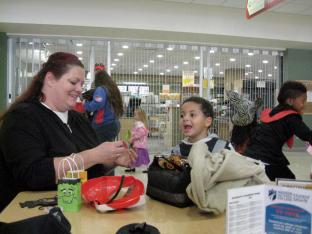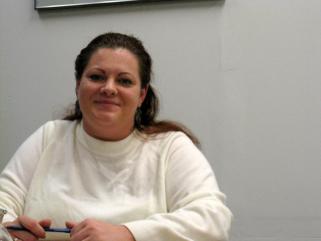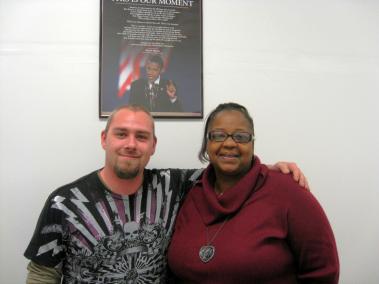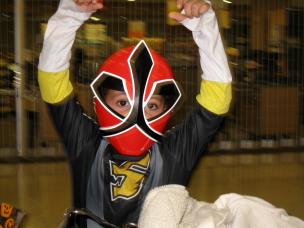






 Brandy and Elon at a Halloween partyIt’s 9a.m. on Oct. 29, and Brandy McClernan is trying to dress her 4-year-old son, Elon for a Halloween costume party.
Brandy and Elon at a Halloween partyIt’s 9a.m. on Oct. 29, and Brandy McClernan is trying to dress her 4-year-old son, Elon for a Halloween costume party.
Elon is wearing the black Power Ranger’s outfit this year. He needs to find the matching mask, but right now he’s more interested in his sister’s pet hedgehog. He swings its cage, sets it down on the couch and runs a circle round the living room.
“Elon! What did I tell you? The neighbors downstairs are going to complain about you runnin’ around here with your big feet,” McClernan says to her son.
McClernan has been renting this apartment for a month now, which she shares with her son and two daughters. The complex straddles Fitchburg’s northern edge, near one of Madison’s most disadvantaged areas: the Allied-Dunn’s Marsh neighborhood.
In a town meeting last spring, former mayor Dave Cieslewicz said Madison no longer had any “deeply troubled neighborhoods,” yet the city’s neighborhood indicators suggest otherwise.
According to the statistics, over 20 percent of Allied-Dunn families lived in poverty last year and the unemployment rate hovered at 13.3 percent—over twice that of greater Madison’s.
But to McClernan, and other Allied-area residents who face problems common to low-income neighborhoods—unemployment, single parenthood, or criminal backgrounds—abstract statistics have little bearing on daily reality.
For McClernan, hope would have been little more than a Hallmark cliché had she not found the support she needed from the Madison Apprenticeship Program (MAP). MAP is a community-based, 12-week course in life skills, job-skill training, and confidence building that serves residents of the Allied-Dunn neighborhood.
Diana Shinall, MAP director and instructor, says she founded the program in 2005 after she realized that the conversation on revitalizing the Allied-area was missing one important piece—investing in the people.
Shinall, who has a background in social work, says she started knocking on neighborhood doors and asking the residents what they thought they needed to find success.
She says she noticed a lot of individuals she met had marketable skills, but did not know what to do with them, or suffered from low self esteem. The solution, Shinall realized, pertained as much to giving these individuals hard job-skills, like typing and effective communication, as it did to restoring their confidence and self-image.
To address these issues, Shinall began to craft a program curriculum.
“I wanted to create a 12-week course where at the end, people could graduate and have a map for their lives. Some people kept saying, "people won’t come." But I had faith they would come. And they did.”
Shinall started her first class in 2005 with 20 students, 13 of whom graduated. After 12 weeks of a curriculum that ranges from Language Arts and finances to leadership and communication, students were given a makeover, professional attire, and a cap-and-gown graduation ceremony—a custom that continues today.
“MAP is proving to be a nontraditional program that offers traditional results,” says Shinall.
Shinall says that since the beginning, she wanted to offer classes that were realistic for students to attend: childcare is provided, dinner is served, and transportation is offered anyone who may need it.
“Get you some food,” Shinall says to her students before they begin each class.
Now in its sixth year, MAP has graduated 132 individuals. The program boasts a 75 percent success rate, which Shinall defines as an individual finding employment, enrolling in college, or progressing toward a specific goal. Brandy now works as a receptionist for MAP
Brandy now works as a receptionist for MAP
McClernan is one such example. In her apartment Saturday morning, McClernan heats a bowl of oatmeal for Elon while her daughters sleep in their bedrooms. She reheats her coffee, and tells the story of how she grew up, went to prison, lost faith and finally found the support she needed from MAP.
She learned about MAP at a job fair three years ago, after she was released from Taycheedah womens’ prison and was looking for employment. With a criminal record, and little to put on a resume, McClernan says she saw the program as a necessary alternative to her former lifestyle.
“You do what you can do to survive,” she says. “I knew I could go back to selling drugs, and I might pay the bills. Coming out of prison, you already feel like a failure. But you can’t add to that, you can’t be sent back, away from your kids. You have to make up for lost time.”
But McClernan says she found more than job-skill training at MAP. McClernan credits a large part of her success to the structure and support she received from Shinall and her classmates.
“At the end of 12 weeks, we’re like a family. You feed off each other’s’ positivity and you grow from it. And most graduates still stop back, just to say hi and eat a meal,” she says.
After McClernan completed classes, she says Shinall approached her and wanted to put her on the payroll. Today McClernan works three nights a week as a MAP receptionist, and attends classes at Madison Area Technical College, where she plans to receive a certificate for substance abuse counseling.
“When I was younger,” McClernan says, “I remember looking at magazines and seeing pictures of living room sets. I’d say I want this or I want that, but I knew that in reality I was just living day to day, struggling to get by. This is what MAP gave me: the ability to know that it’s OK to have hopes and dreams again. That it’s never too late to change.”
Shinall credits McClernan’s accomplishments to the commitments she has made—and kept—to herself and her family.
“A lot of people come in here teetering on change,” says Shinall, “They may want to, but maybe times get tough and they go back to old behaviors. Maybe Brandy felt like that in the beginning. But something happened, and she made a turn. Today, I see her actions matching her words.”
 Jason Simmers and Diana ShinallJason Simmers, who graduated MAP in 2009, speaks openly of his personal turning-point. Now 28, he says he’s known insecurity since he was a child, moving constantly, sometimes sleeping on a family member’s couch. He says he founds drugs and crime at an early age—habits that eventually led him to a two-year stint in prison for burglarizing a convenience store.
Jason Simmers and Diana ShinallJason Simmers, who graduated MAP in 2009, speaks openly of his personal turning-point. Now 28, he says he’s known insecurity since he was a child, moving constantly, sometimes sleeping on a family member’s couch. He says he founds drugs and crime at an early age—habits that eventually led him to a two-year stint in prison for burglarizing a convenience store.
After he was released, Simmers says he did odd construction jobs and worked at McDonalds, doing anything he could to make rent. He had a downstairs neighbor at the time, a former MAP graduate, who told him about the program. It was at MAP, he says, where he finally found the confidence he had been lacking.
“When I came in, I was under the assumption that I was a nobody. I was ready to slit my wrist. But when I met Ms. Shinall, and I saw how badly she wanted me to succeed, I started to want that for myself. She believed in me until I could believe in myself,” says Simmers.
After he graduated MAP, he says Shinall encouraged him to apply for a maintenance job at Madison’s Children’s Museum. Simmers was hired, and now works full-time at the museum and supports his family on a steady income.
“Today when I wake up, I know I can’t ever go back to the way things were. I see where I live, I see my daughter and my fiancée, and I feel pride that I haven’t felt in a long, long time,” says Simmers.
District 10 Alderman Brian Solomon says he has supported MAP since the beginning, and that the transformative process that McClernan and Simmers speak of is part of what of makes MAP unique.
“There are so many programs available in Madison, but I think what sets MAP apart is this nonjudgmental demeanor Shinall has with students,” says Solomon. “But it’s more than that. When students learn a skill, say math, something you or I may take for granted, something changes in them that carries over into their personal lives.”
Solomon says that in one way or another, every student in MAP’s program is facing problems that are emblematic of problems facing the Allied neighborhood as a whole. It is programs like MAP, he says, centered on people, which succeed where many other programs fail.
“The people that live in the neighborhood, like the people that attend MAP classes, are the most inspiring parts of what I do,” he says. “These are people who have gone through things that most of us can’t even imagine, yet are somehow able to hold on, work two jobs, raise kids. It’s an amazing story of survival.” Elon, in his Power Ranger's costume
Elon, in his Power Ranger's costume
But for McClernan, it's about more than just survival--it's about making a better life for her children.
They arrived at Saturday’s costume party just in time for a few songs and bags of candy. Elon never did find his matching black mask, but he improvised, and wore the Red Power Ranger’s mask instead.
As her kids went to play and find more treats, McClernan’s thoughts turned to her future goal of working as a substance abuse counselor.
“I’m not trying to be rich or anything,” said McClernan, “I just want to be somebody for my kids to look up to, somebody they can be proud of. And I want to help people understand that it can be better than it was before.”
|
|
|
Welcome to the Madison Commons, a website designed to provide news and information about all of Madison's neighborhoods and a crossroads for the discussion of community issues. The name comes from the idea of a village commons, a place for news, talk, debate, and some entertainment, too, that's open to everyone.
All rights reserved. Read more about the Madison Commons and its partners.


Comments
way to go MAP
This program is awesome